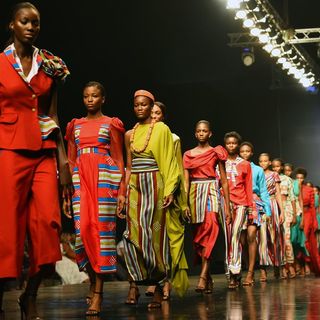
The Feminist Revolution Can Happen in the Kitchen
“Knowing how to cook and being a feminist do not have to be mutually exclusive.”

Every time I cook a meal that both looks and tastes good, I take a few moments to absorb the fact that it is I who did it. That feeling of surprise (and a bit of pride) is tinged with feelings of guilt and shame, because I think to myself: as a 24-year-old, it should ideally not be such a big feat to accomplish.
I sometimes find it amusing that the reason for my delayed evolution as a person who possesses basic survival skills is linked with my feminist awakening as a young girl growing up in an upper-caste, patriarchal family. As somebody who was trying to make sense of feminist ideals amid an environment that had very strict gender roles, I started to believe that everything I was ‘supposed’ to do as a girl was automatically not something I wanted (and/or needed) to do in life. Because how else do you rebel, right?
*
In the 1970s, Spare Rib,a second-wave feminist magazine, was started with the idea that “First you sink into his arms, then your arms end up in his sink.” Because domestic chores were considered a woman-only job, the feminist movement tried to help women relieve themselves of those ideas and responsibilities, and instead adopt the skills that were traditionally considered masculine.
The movement has grown leaps and bounds in the following decades, but as a young girl, rigid definitions of feminism that rejected traditionally feminine gender roles stuck with me and created unforeseen problems that I am trying to battle even to this day.
Equipped with feminist theory and a desperate urge to rebel against my family, I started to see through the instruction manuals handed down to girls. The underlying idea was for girls to emerge as sanskaari women, looking after their hearth and home.
So, I ran as far away from the hearth and home (and sugar and spice, and all things nice) as was humanly possible. I wasn’t going to get bothered by inconsequential matters of cleaning, washing, ironing, cooking.
Related on The Swaddle:
Finding Kinship in a Pot of Curry
Instead of identifying them as necessary life skills for one and all, they bore the brunt of my hangover with second-wave feminist ideals, and became monsters with their heads dipped in patriarchy — simply put, they were the enemy.
I grew up to be the spoiled adult who could not tell methi from dhaniya, and who took pride in it.
It would be safe to mention at this point that my relationship (or lack thereof) with cooking, has been interwoven with my relationship with femininity. Courtesy of sexist gender stereotypes, it was a given that having to do anything with cooking was an essentially ‘feminine’ characteristic. And as a girl, my desperate attempts not to be seen as ‘less than’ were unfortunately marked by my attempts to present as less/not ‘feminine.’
When a young girl enjoys cleaning the house and pretend-cooking for her Barbie family, the last thing she wants is bhabhis and chachis rejoicing over the fact that she wouldmakethe perfect wife.
I remember preparing tea for my family gatherings as a teenager. I remember enjoying it, feeling in charge of the kitchen. I remember reveling in the various compliments that came my way. Amusingly, I have always looked for my family’s validation in whatever I did, because it hardly came by for things except my tea making and dusting skills. As a young girl though, they were enough for me to hold on to, because at least I added some value, right?
It did not take long for those compliments to slip into territories I had not imagined. They went from people telling my mother that she is lucky her daughter makes such delish tea, to rejoicing over the fact that she would not face problems while marrying me off — that my training to be a ‘good’ housewife was already in full swing.
It was earth-shattering for me to realize that all of those things were essentially intertwined with my gender. They made me an alluring prospect for marriage. And that was the instant I started to desperately rub the she-makes-the-best-tea tag off my sleeve.
*
My mother would often recite anecdotes of when she was a young girl and was always on the lookout for new ways to experiment with food. Her love for cooking is still in full swing, along with her eager wish that at least one of her two daughters enjoy it as much as she does.
But even when I always knew deep inside that this wish is the result of her passion towards cooking, a lot more than her desire to make us into well-trained brides, I could not get myself to open up to the possibility of looking at it as something other than a vain pursuit.
I don’t share a relationship with cooking that is my own; it either came to me packaged as something I needed to do to be a good woman, or as something I needed to not do, to be a liberated woman. I took refuge in settling with the latter for a few years, but only recently realized I had missed the point completely.
The first time I saw my online friends enjoying cooking and posting pictures and recipes of the dishes they cooked, I could not be more shocked. I was perplexed, to say the least, but I knew that I needed to reorient my worldview.
However, I would be lying if I said that it was just the many cooking posts on Instagram that prodded me in that direction. My no-to-everything phase was of course difficult for my parents, but primarily for my mother.
What was once an extra helping hand for her became another rowdy member of the house who entered the kitchen only to drink water. Every time my mother even tried to understand what had happened, I would disdainfully question why she did not have the same expectations from my brother, and put an end to any chances we had of arriving at an understanding.
However, over the course of time, our conversations progressed from me constantly attacking her, to trying to listen to what she had to say about the world she grew up in and how that shaped everything she knew. As she came closer to understanding the earnestness with which I refused to be seen through preconceived notions of gender, I also found a way to acknowledge her worldview and encourage the shift in perspective that was now underway.
We slowly managed to navigate our way to having a real conversation, instead of merely reacting to each other. She, then, asked me, “Okay you don’t want to do it, don’t do it. But what am I supposed to do? Do you ever think about how much more work I am having to do because of all this?”
That was it.
That was when I realized that knowing how to cook and being a feminist do not have to be mutually exclusive. Amidst this constant ping-pong between gender roles, I was getting caught in another patriarchal trap of shunning everything that is considered ‘feminine’. The voracious disavowal of the pink color and desperate attempts not to be ‘like all the other girls’ are just more ways in which our internalized sexism and misogyny show their evil faces. And it’s time we let go of them.
Related on The Swaddle:
Life Skills for Children (So They Don’t Turn Into an Adult Hot Mess)
I, now, make it a point to put together my lunch on days my mother feels too unimaginative to decide what to cook. But what makes her happiest is that I don’t give her the chance to summon me in the kitchen. I am already there, scanning the kitchen slab to see if onions need to be chopped or tea needs to be made.
As I started to actively take more responsibility, I made it a point to vocalize the importance of everyone taking the responsibility of at least some part of the housework from time to time.
Delightfully, this was met with a sincere reception by my family. My father is seen frying pakoras alongside my mother, while she soaks the vegetables in besan before releasing them in the frying pan; my brother makes sure that he is responsible for at least one of his meals everyday.
The kind of joy that this brings to my mother is insurmountable.
As I leave my room to put together yet another Sunday lunch, I would like to say that my explorations of the kitchen have been mired with myriad tastes and flavors. But, in different ways, it continues to teach me to enjoy the little joys of life; the sound of frying onions in a pan, the sight of perfectly diced tomatoes, the smell of freshly cooked food. And, the smile on my mother’s face when I wake her up with a cup of her favorite ginger tea.
Adishi Gupta is passionate about issues of equality and social justice and hopes to make mental health a part of everyday conversations in India. She loves to read and write. Over the years, she has found comfort in documenting and collecting fallen leaves and flowers. She loves to look at cloudy, blue skies and hear the rustling leaves of a tree.
Related


Peripheral Vision: a 20‑Year‑Old Nanny from Kashid
